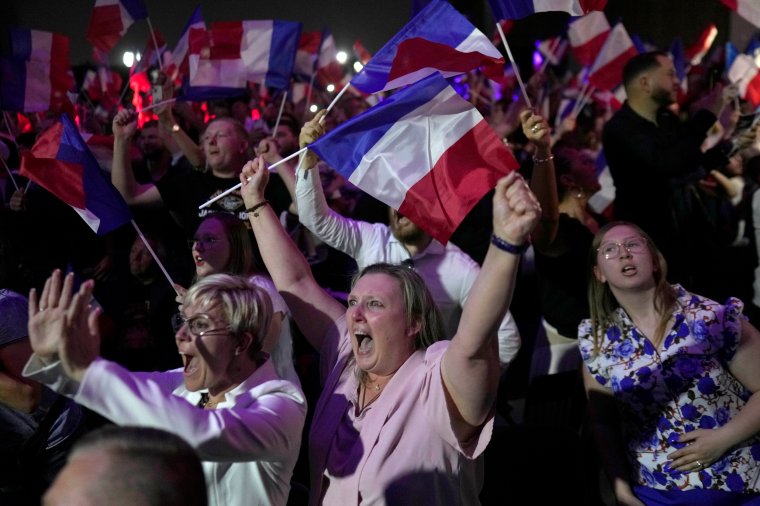Marine Le Pen’s anti-immigration, far-right National Rally (RN) party stands a good chance of winning a majority in France’s parliamentary elections for the first time, a victory that would reverberate through Europe and across the Atlantic.
In Sunday’s first round, RN and its allies were ahead with around one-third of the votes, placing them in good stead for this weekend’s run-off.
While experts believe RN is unlikely to gain a majority of 289 seats in the 577-seat National Assembly, the lower house of the French parliament, there could be potential for a coalition government that is dominated by the party.
Its campaign has been mainly focused on domestic issues where it can comfortably win votes, but areas of foreign policy and diplomacy such as the Nato alliance, war in Ukraine, and UK-France ties have been largely missing from its talking points.

Dr Paul Smith, associate professor in French history and politics at the University of Nottingham, said relations between London and Paris may be “very tentative to begin with” and potentially “strained”, particularly if Labour’s David Lammy, who previously described Ms Le Pen as a “fascist”, becomes the next Foreign Secretary.
One of the biggest bones of contention will be over Channel crossings. “If anybody thinks the French are suddenly going to be more accommodating to the British government in that regard, [they] have another thing coming,” Dr Smith told i.
“The far right in government in France, its immigration rhetoric is ‘if they [migrants] want to come here on their way to Britain then off you go’.”
RN has made no secret of its disdain for EU institutions, and has said it wants France to leave Nato’s integrated command – which the country previously did in 1966 before rejoining in 2009 – though not while the war in Ukraine is ongoing.
“A National Rally government would be a kind of [Nato] partner that drags its feet, rather than an enthusiastic figure backing the Baltic states, which would make them a bit nervous,” said Dr Smith.
Ms Le Pen had a longstanding reputation as “Putin’s friend”, with French President Emmanuel Macron accusing her of being on the Russian payroll.
She was loaned €6m (£5m) by First Czech Russian Bank in 2014 to help finance political activities and election campaigns. After the bank went bust, the loan was passed to the Russian company Aviazapchast, which supplies Russian military aircraft and parts in the Middle East, Africa and Asia.
RN said it paid back the loan last year and Ms Le Pen, who was pictured with Vladimir Putin in 2017 while she was running for the French presidency, has tried to distance herself from previous pro-Kremlin statements, going as far as criticising Russia’s actions in Ukraine.
Rainbow Murray, a professor and expert on French politics at Queen Mary University in London, said the party has had to “tone down” its language on Ukraine and that its historical links to Russia have been “embarrassing” for the party.
“Since the war broke out [in February 2022], they’ve had to take a step back from their Russian links but in their hearts I don’t think they really have,” Professor Murray told i.
“They have declared some support for Ukraine, but I think it’s mostly going through the motions and they are not really willing to put their money where their mouth is… they don’t want to back [their support] with sending arms, munitions, certainly not soldiers on the ground. They’re more willing to pay lip service to it.”
Jordan Bardella, who succeeded Ms Le Pen as the leader of RN, assured that his party would not allow Russia to absorb Ukraine if it came to power in the parliamentary elections, as he pledged both “support for Ukraine and avoiding an escalation with Russia”.
“I will not let Russian imperialism absorb an allied state like Ukraine,” he said in a televised debate on Thursday.
Mr Bardella said if he becomes prime minister he would not send French soldiers to Ukraine, in reference to Mr Macron’s controversial refusal to rule out deploying troops there.
“Macron said (unilaterally, without consulting his Nato partners) that he would be prepared to put boots on the ground in Ukraine, but Bardella has not and is remaining quite careful and vague,” the political scientist Dr Françoise Boucek told i.
“He keeps saying they will first do an audit of government finances before making any commitments.”
Citing escalation risks, Mr Bardella also opposed sending long-range missiles to Ukraine that could strike Russian territory, a position that contrasts with other Nato allies who have expressed support for Kyiv’s use of Western weapons against targets inside Russia.
Even if Mr Bardella becomes the French prime minister, Mr Macron would remain the country’s president and the head of its army, but he would lose control over key domestic issues including economic policy and security which would affect aid to Ukraine.
Ms Le Pen told the French newspaper Le Télégramme that the president’s title as commander-in-chief of the armed forces was “honorific, because it’s the prime minister who holds the purse strings”.
Dr Boucek explained: “Macron’s room of manoeuvre will be constrained by the forces in parliament where the majority party or alliance of parties control the purse strings and therefore the budget.
“A new budget has to be passed in the autumn. So, any additional spending on armaments for Ukraine, say, will depend on this.”


